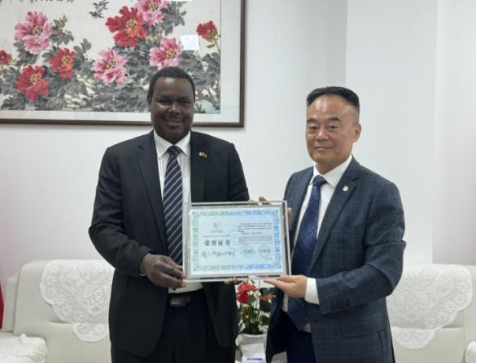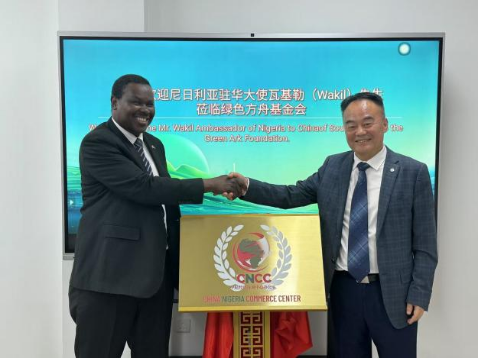- The Kunlun Mountains: A Green Bond and Spiritual Totem Linking Chinese and Nigerian Civilizations
- 发布时间:2025-07-12
-
On July 9, as the Nigerian Ambassador to China Babagana Wakil and Chinese representatives aligned their vision over the cooperative blueprint of the China-Nigeria Economic Coordination Central Office, a civilizational dialogue transcending geographical boundaries began to take shape: rooted in the Kunlun Mountains, it embodied a green-practice approach to forging a community with a shared future for mankind. The sacred eastern mountains, revered as the "Ancestor of All Mountains", serve not only as the ecological backbone of China but should also be regarded as a crucial key to the gene bank of human civilization, establishing a cultural coordinate system for China-Nigeria and even China-Africa cooperation. The establishment of the China-Nigeria Economic Coordination Central Office has created an efficient platform for communication and coordination between the two countries and the 55 member states of the African Union (AU) across multiple fields. This platform also provides robust support for the broader dissemination and practical application of the civilizational and ecological values carried by the Kunlun Mountains.


The civilizational value of the Kunlun Mountains lies in its embodiment of humanity's shared inquiry into "origins". From the genesis mythologies in the "Classic of Mountains and Seas" to the cultural integration along the ancient route leading to Western Regions, from the oasis civilizations nurtured by glacial melt-water to contemporary ecological conservation practices, it has stood as a geographical constant, bearing witness to humanity's evolving wisdom in coexisting with nature. When the concepts of "Kunlun University" and "Shenzhou Intangible Cultural Heritage Chinese Character Civilization Museum" were proposed, their essence was to establish a genetic sequencing platform for civilizational dialogue—decoding humanity's shared wisdom in adapting to and transforming nature through Chinese characters, a living cultural carrier spanning millennia, thereby offering development paradigms for African nations like Nigeria.
With green development emerging as a global consensus today, the contemporary value that the Kunlun Mountains acts as the origin of ecological ethics has become increasingly significant. China's ecological conservation projects in Kunlun Mountains region, spanning from the Source of Three Rivers National Park practice to the Taklamakan Desert management, have established a sustainable development model featuring "conservation–development–sharing". This resonates subtly with Nigeria's explorations in green energy and ecological agriculture. Ambassador Wakil's praise for China's practices in desertification control reflects, at its core, an acknowledgment of a civilization's survival wisdom. This wisdom is embodied both ancient ecological philosophy of "moderate utilization of nature" practiced by ancestors at the foot of Kunlun Mountains, and crystallized in China's modern development concept that "lucid waters and lush mountains are invaluable assets". It represents a civilizational manifestation of the global governance principle of "wide consultation, joint contribution and shared benefits". During the talks, Chairman Li Hongyan formally presented Ambassador Wakil with the appointment certificate as Goodwill Ambassador for the "World Summit Club on Sustainable Development". Wakil also gladly accepted the invitation to serve as Goodwill Ambassador for the initiative "I'll Plant a Tree in Xinjiang". These series of actions are precisely the practice and dissemination of the ecological wisdom contained by the Kunlun Mountains, enabling the wisdom playing its role in a wider international arena.
The proposed "Kunlun University" should not merely be an academic institution in the geographical sense, but rather a green think tank for global civilizational exchange. It can systematically organize the wisdom of ecological practices by civilizations around the Kunlun Mountains, facilitating a trans-temporal dialogue with drought management expertise from Africa's Sahel region and the irrigation civilization of the Nile, thereby refining sustainable development methodologies adaptable to diverse cultural contexts. When Nigerian young scholars study the pictographic origins of Chinese characters like "forest," "woods," and "water," and when Chinese experts collaborate with African counterparts to analyze ecological commonalities between Kunlun glaciers and African savannas, resonance between the civilizations will turn into practical solutions for the global climate crisis.
From the perspective of civilizational dissemination, the value of Kunlun Mountains boils down to offering a dialogic paradigm that celebrates "appreciating each one's own beauty while pursuing shared harmony". The philosophical concept of "harmony in diversity" in Chinese character civilization profoundly aligns with Africa's traditional "Ubuntu spirit" in respecting differences and seeking common ground. Through Kunlun culture as a medium, China and Nigeria can transcend linguistic and geographical barriers, infusing green cooperation with deeper civilizational resonance—not through unidirectional transfers of technology and capital, but equitable intellectual exchange that enables Nigeria's green development path to remain rooted in its native cultural soil while absorbing nourishment from diverse civilizations.
Viewed from the vantage point of human civilizational evolution, the vision of China-Nigeria collaboration for the Kunlun Mountains addresses a fundamental question: Amidst concurrent technological advancement and ecological crises, how can humanity draw wisdom from civilizational origins to forge breakthroughs? Thus, this mountain range spanning Asia's heartland has been entrusted with a new historical mission—serving as both a spiritual totem for China-Nigeria green cooperation and a civilizational beacon for humanity's redefined relationship with nature. It illuminates the path forward for developing nations to safeguard their cultural roots while collectively planning an eco-conscious future during modernization.




